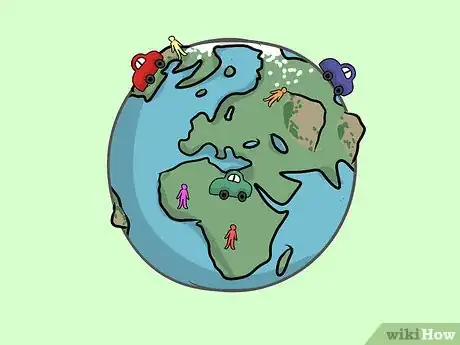X
wikiHow is a “wiki,” similar to Wikipedia, which means that many of our articles are co-written by multiple authors. To create this article, volunteer authors worked to edit and improve it over time.
This article has been viewed 1,314 times.
Learn more...
The career you choose is probably the most important decision of your life. Some jobs do much more for the world than others, and you don’t have to become a doctor, teacher or charity worker to have a positive impact — many other paths can be even more impactful. One important factor in having an impactful career is your choice of problem to work on. The more pressing the problem you’re trying to solve, the more significant your impact.
Steps
Part 1
Part 1 of 5:
Define your Career Priorities
-
1Define your personal priorities. Your job should be personally satisfying for you. The work needs you to stick with it for the long term, as most people reach peak productivity between the age of 40 and 60—your career is a marathon, not a sprint. Consider work that is:
- Meaningful
- Something you’re good at
- Engaging & where you have autonomy
- With supportive colleagues
- Has basic conditions (e.g. no long daily commute) and fits with your life (e.g. non-crazy hours).
-
2Define impact. Your career’s impact is given by the number of lives you improve and how much you improve them over the long term. Your impact is the product of:
- How pressing is the problem that you address
- How effective is the job at tackling the problem
- Your personal fit, which depends on your abilities and career capital (skills, connections, and reputation).
Advertisement
Part 2
Part 2 of 5:
Choose a Pressing Problem To Solve
-
1Define a pressing problem. Think hard about which problems you work on, as it might be your most important choice. The most pressing issues are:
- Big: What’s the magnitude of this problem? How much does it affect people’s lives today? How much effect will solving it have in the long run?
- Neglected: How many people and resources are tackling this problem? How well allocated are these resources?
- Solvable: How easy would it be to make progress on this problem? Do interventions already exist to solve this problem effectively, and how strong is the evidence behind them?
-
2Find a pressing problem. Identify an issue that seems big, neglected and solvable. You don’t need to research all by yourself—find a trusted person or organisation. Some of the most pressing problems include:
- Existential risks that threaten the destruction of humanity’s long-term potential. These arise from artificial intelligence, biological hazards, great power conflict, nuclear security, and extreme climate change.
- Animal welfare. Humans slaughter 70 billion land animals every year. That’s ten times the human population. Animal lives on factory farms are miserable.
- Global health and development. Eight hundred million people in developing countries live in absolute poverty—with less than $1.90 per day. Five million children die every year, mainly from preventable causes.
Advertisement
Part 3
Part 3 of 5:
Set a Long-term Career Goal
-
1Explore the key categories of impactful careers. Before thinking about specific career paths, it’s valuable to consider what kinds of careers tend to have the highest impact. The career categories below can enable you to make a big contribution to whichever global problems you think are most pressing:
- Government and policy in an area relevant to a top problem. Work out how government policy can help solve the most pressing issues, and help make those policies happen.
- Organisation-building at effective nonprofits. Help build great organisations doing important work via entrepreneurship, operations, people management, project management, fundraising, or administration.
- Research in relevant areas. Aim to make intellectual advances about how to tackle the world’s most pressing problems.
- Apply an unusual skill to a needed niche. A wide variety of skills is needed. If you already have expertise in a narrow area, there might be a way to apply it to a pressing global problem.
- Communication. Convey important ideas and information in a compelling way, and you can help others focus on the right things and work more effectively.
- Earning to give. Take a job that fits you well and lets you contribute financially to funding-constrained, highly-effective organisations.
-
2Create a strategy. Career strategy has three basic steps: explore, take bets on paths that build your strengths, and then use your strengths to solve pressing problems.
- Explore. Early on (<25 years old), run experiments to learn about yourself. Use summer internships. Read about topics you’re interested in. Talk to people you admire.
- Invest. Later (26-35 years old), invest in your career capital (skills, connections and credentials that put you in a better position to make a difference in the future).
- Deploy. When you have lots of career capital (36+ years), use it to address the greatest needs within the most pressing problems.
Advertisement
Part 4
Part 4 of 5:
Explore Short-term Career Options
-
1Find your next career move. Once you have ideas for longer-term paths, get very specific about concrete jobs/education/side projects you might take. Generate a long list of options—most people consider too few. Then compare them in terms of the following factors:
- Career capital
- Impact
- Personal fit
- Information value you’ll gain from testing them out
- Other personal priorities.
-
2Have a plan B and a plan Z. List promising alternatives you can switch to if your plan A doesn’t work out. If you’re ambitious enough, your plan A probably has a good chance of not working out—so you should be ready to try again.To avoid unacceptable risks, write a plan Z—how you’ll get back on your feet if things go wrong. For example, you might move back to your parents’ home for two months, work in a local cafe and replan your career.
-
3Run cheap tests. Investigate your key uncertainties like a scientist. Start with the least costly ways to learn more (like reading online) and then take more expensive steps (like doing a trial project) if you’re still uncertain.
- Speak to people in the area
- Use the summer for valuable internships
- Volunteer
- Read about topics you’re interested in
-
4Check high-impact job boards. Find vacancies in a curated list of high-impact jobs. 80,000 Hours lists open positions that directly address some of the world’s most pressing problems, while others may help you build the career capital you need to have a big impact later. Check out the 80,000 Hours Job Board.
-
5Get free 1:1 advice. Career planning can be tough to do by yourself. 80,000 Hours is a nonprofit that provides research and support to help students and graduates switch into careers that effectively tackle the world’s most pressing problems. Their advisors can help you choose your focus, make connections, and find a fulfilling job to tackle one of the world’s most important problems. Apply to speak with 80,000 Hours.
Advertisement
Part 5
Part 5 of 5:
Spread the Word
-
1Talk to a friend. Share your personal story. By inspiring another person to make a difference in their career, you multiply your impact.
-
2Gift a free book. Here are three books for building a successful career focused on tackling the world’s most pressing problems. Get your free copy here.
- The Precipice: Existential Risk and the Future of Humanity by Toby Ord
- 80,000 Hours: Finding a Fulfilling Career That Does Good
- Doing Good Better: Effective Altruism and How You Can Make a Difference by William MacAskill
-
3Join an impact-oriented community. Discussing things with others is often the best way to make progress on your questions. Effective altruism is a global community with thousands of members. Here are some ways to get connected:
- Join a virtual program to discuss these ideas in a series of online meetups, hosted by experienced facilitators
- Find an effective altruism event, from live conferences to in-person and virtual meetups
- Join an effective altruism group, either locally or online
Advertisement
References
About This Article
Advertisement



































































